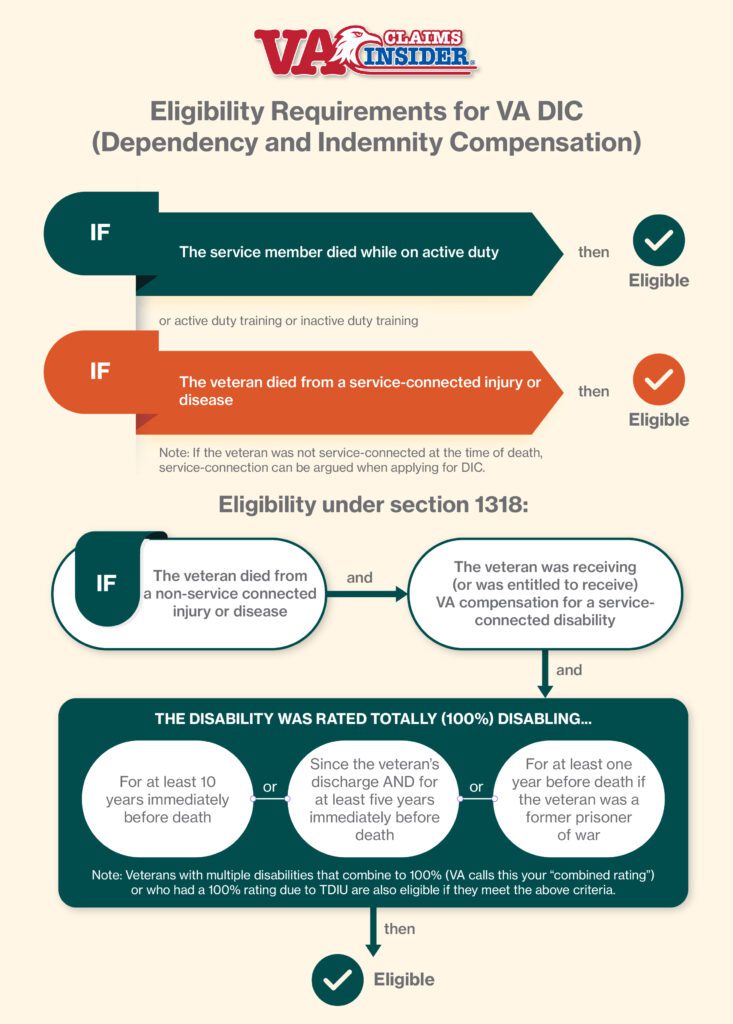Looking for Expert-Level VA Claim Answers?📱Call Us Now! 737-295-2226
VA Dependency and Indemnity Compensation Rates
The surviving family of a service member who died in the line of duty or due to service-connected disability is eligible for Dependency and Indemnity Compensation (DIC) benefits.
The Department of Veterans Affairs offers tax-free disability compensation to spouses, any dependent or helpless child, and parents of an eligible veteran.
DIC rates are updated on an annual basis and as Insiders, we will keep you in the loop of all the latest information. The Department of Veteran Affairs provides instructions for submitting a claim and we’re here to make it as easy for you as possible.
When a service member or veteran passes away, the surviving family members may frequently be eligible to keep receiving the monthly payment, particularly if they were financially reliant on their loved ones.
Beneficial effects of the Social Security Act can include cash benefits, disability monthly payments, and burial or cremation costs for survivors.
These benefits might be particularly useful for those who have suffered a personal tragedy as well as a financial loss in both present and future earning capacity. Dependency and Indemnity Compensation (DIC) is the most significant of such programs for survivors (DIC).
Here we will shed light on Dependency and Indemnity Compensation (DIC). Plus, we will get to know about VA DIC rates for 2022.

- VA Dependency and Indemnity Compensation Rates
- What Is Dependency And Indemnity Compensation (DIC)?
- Who Is Eligible For Dependency and indemnity compensation (DIC)?
- Will VA DIC Rates Increase In 2023?
- How To Calculate The DIC Monthly Payment?
- How You Can Apply For DIC?
- Best VA Benefits for Dependents in 2022 Video
- About The Author
You DESERVE a HIGHER VA rating.
Take advantage of a VA Claim Discovery Call with an experienced Team Member. Learn what you’ve been missing so you can FINALLY get the disability rating and compensation you’ve earned for your service.
What Is Dependency And Indemnity Compensation (DIC)?
The Department of Veterans Affairs’ Dependency and Indemnity Compensation (DIC) is a VA-administered program that aims to compensate eligible family members who have lost a close family member. It is a monthly benefit paid to the VA dependents that can include an eligible child, any surviving spouses, or a parent surviving after the veteran’s death.
The deceased must have served in one of the six military branches or, in some situations, the National Guard or Reserves.
Eligibility Criteria For Veterans
The veteran must also fulfill one of the following requirements stated below.
- They were a member of the military who died while on active duty, while training on active duty, or while performing inactive duty training, OR
- They were a veteran who died as a result of a service-connected disability or disease, OR
- They were a veteran who did not die as a result of a service-connected disability or disease, but were totally disabled by a service-connected disability:
- For at least 10 years before death, OR
- Since their release from active duty and for at least five years before death, OR
- For at least one year before death, if they were a former prisoner of war and died after September 30,1999.
DIC offers a monthly living benefit to surviving relatives, which is determined by your relationship with the deceased, financial situation, and living circumstances.
If you are a surviving spouse and have dependent kids in your household, for example, your compensation may go up.
DIC benefits are applied for by survivors. Survivors who can apply are surviving spouses, children, and parents.
Who Is Eligible For Dependency and indemnity compensation (DIC)?
Veteran’s Surviving Spouse
If this describes you and you meet any of the following conditions, you may be eligible for DIC benefits as a surviving spouse.
You are eligible if you resonate with one of the statements below.
- If the surviving spouse was married to a member of the military who died on active duty, on active duty for training, or in inactive duty training, OR
- If the surviving spouse married the deceased veteran before January 1, 1957, OR
- If the surviving spouse married a military Veteran who died as a result of a service-connected injury or disease, as long as the marriage began within 15 years of discharge, OR
- If the surviving spouse was married to the deceased veteran for at least a year, OR
- If the surviving spouse had a child with the veteran and cohabitated with him or her until his or her death.
Please keep in mind that if the surviving spouse has a child with the veteran but was divorced, the surviving spouse must not be at blame for the breakup and must not remarry to be eligible.

Moreover, if the surviving spouse may be entitled to compensation if:
- The spouse remarried on or after December 16, 2003, and was at least 57 years old at the time of remarrying.
- The spouse remarried on or after January 5, 2021 and was 55 years of age or older at the time of remarrying.
Surviving Children
You might be eligible for DIC if you are the surviving child of a veteran. The criteria are stated below.
- If the veteran’s death occurred on active duty OR
- If the veteran died because of any disease or injury related to the service.
Next, you need to be an unmarried adult child and either:
- If the child of a veteran is below the age of 18 OR
- If the child of the veteran falls between the age bracket of 18 and 23 and is currently attending school.
Note: If you were adopted out of the Veteran’s or service member’s family, but meet all other eligibility criteria, you still qualify for compensation.
Now, if the surviving child or survivors resonate with these conditions, they will be considered veteran’s eligible surviving children.
Surviving Parents
You may be eligible for DIC if you meet these requirements:
- You are the biological, adoptive, or foster parent of the veteran AND
2. Your income is below a certain rate. This information can be found on the parents DIC rates table here.
Will VA DIC Rates Increase In 2023?
There has been no indication of an update yet. In 2022, the dependence and indemnity compensation rates for veterans rose by 5.9 percent, compared to a 1.3 percent rise in 2021.
This change affects not only the basic benefit rate for a surviving spouse but also additional benefits determined by specific events, such as having a school-age child.
How To Calculate The DIC Monthly Payment?
Surviving Spouses
If you are the surviving spouse of any veteran, your monthly payment of DIC would start at $1,437.66. There are times when DIC benefits may exceed this amount, though. View this guide to check for added amounts based on certain factors.
Surviving Children
If the veteran does have a surviving spouse who is also eligible for DIC, the monthly payment would be $301.74 for a child between 18-23 who is in a qualified school program, OR $607.02 for a helpless child over 18 (a child who became permanently unable to support themselves before age 18).
When a veteran did not have an eligible spouse but had one eligible child, for instance, the monthly pay rate would be $607.02. If there are two qualified children, the monthly pay would be $436.62 for each child. View this guide to see the amounts for 3+ children.

Surviving Parents
For parents, the amount of DIC will depend on two factors
- Your annual income
- Whether or not you live with a spouse
For example, if you are an eligible parent and do not live with a spouse, AND your yearly income is $1,100, your beginning monthly rate would be $483.
View this guide to calculate the amount you are eligible for as a surviving parent.
How You Can Apply For DIC?
The forms you will need to use to apply will differ according to the relationship you had to the deceased veteran. Surviving spouses and children of veterans should fill out VA Form 21P-534EZ. Surviving parents will need to fill out VA Form 21P-535.
If you are the surviving spouse or child of an active duty service member, you will need to fill out VA Form 21P-534a.
The death certificate, marriage certificate (if applicable), and any divorce decrees from prior marriages may all be used as proof.
VA also wants to see evidence of the veteran’s dependent children, such as birth certificates and college or school transcripts.
When necessary, VA requires the aforementioned documents, so submitting them with your application will aid in the processing process.
Best VA Benefits for Dependents in 2022 Video
.embed-container { position: relative; padding-bottom: 56.25%; height: 0; overflow: hidden; max-width: 100%; } .embed-container iframe, .embed-container object, .embed-container embed { position: absolute; top: 0; left: 0; width: 100%; height: 100%; }Need More Assistance?
Most veterans are underrated for their disabilities and therefore not getting the compensation they’re due. At VA Claims Insider, we help you understand and take control of the claims process, so you can get the rating and compensation you’re owed by law.
Our process takes the guesswork out of filing a VA disability claim and supports you every step of the way in building a fully-developed claim (FDC)—so you can increase your rating fast!
If you’ve filed your VA disability claim and have been denied or have received a low rating—or you’re unsure how to get started—reach out to us! Take advantage of a FREE VA Claim Discovery Call. Learn what you’ve been missing—so you can FINALLY get the disability rating and compensation you deserve!
We’ve supported more than 15,000 veterans to win their claims and increase their ratings. NOW IT’S YOUR TURN.



